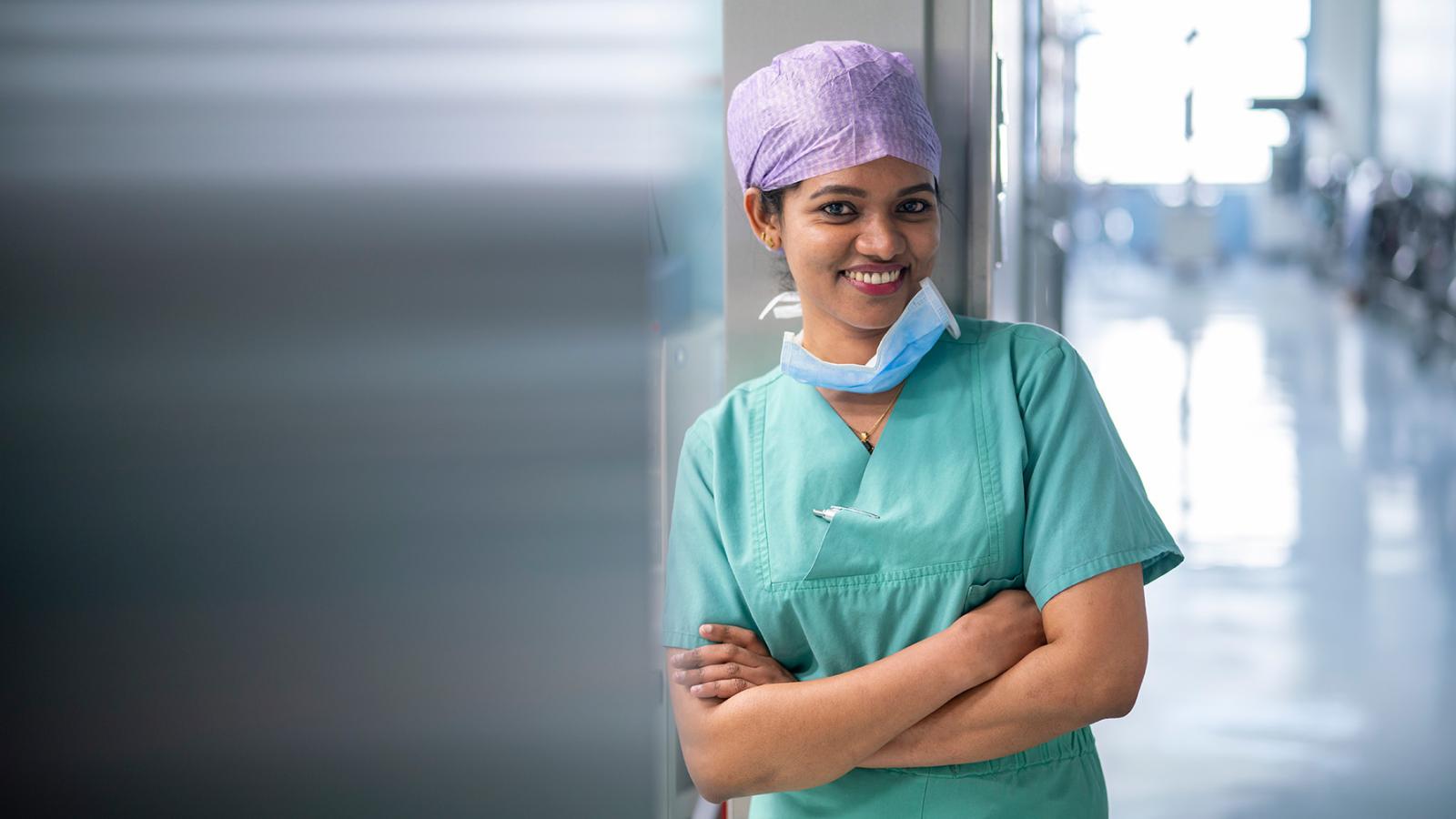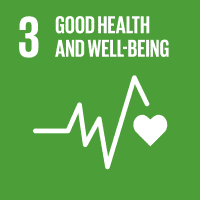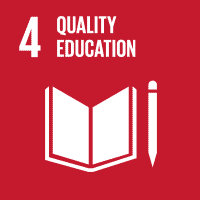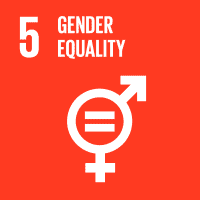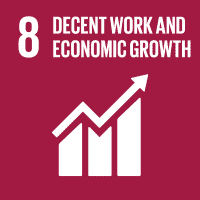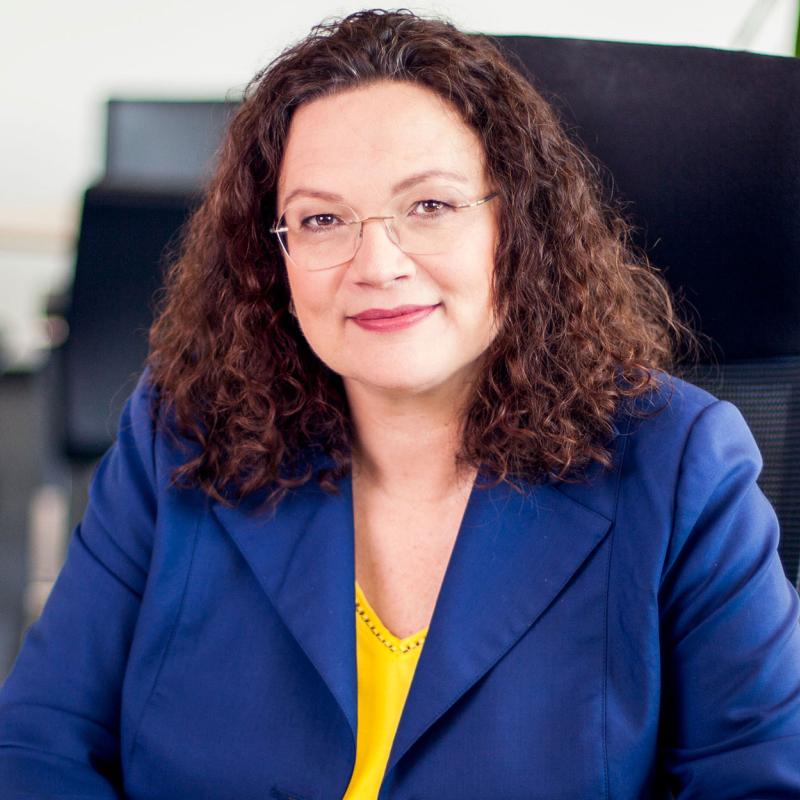To ensure fair, sustainable migration GIZ and our partners focus on recruitment in line with international ethical standards. This includes the certification system for private agencies recruiting at international level (the International Recruitment Integrity System, IRIS) of the International Organization for Migration. GIZ also takes its lead from the regulations of the World Health Organization (WHO), which stipulate that medical professionals should only be recruited in areas where this will not result in shortages on the local labour market.
Skilled workers from Kerala for Wolfratshausen
How an Indian nurse and a district hospital in the foothills of the German Alps came together: Triple Win explained – experience with placing skilled workers.
Although they are surrounded by the sterile, gleaming chrome of the operating theatre, the atmosphere is warm and friendly as Monika Schwenger practices technical vocabulary with her colleague Chippy Bose Shaila. Theatre nurse Monika Schwenger is calm and patient, and very precise in her enunciation as she goes through every surgical instrument laid out on the small table under the huge theatre light: ‘Querklemme, Kofferklemme, scharfe Klemme.’
The experienced operating theatre nurse practitioner is meeting with her new colleague to help with the names of the instruments. ‘Querklemme, Kofferklemme, scharfe Klemme,’ Shaila repeats in impressive German. The Indian nurse has only lived and worked in the Bavarian town of Wolfratshausen since August 2023. She was a theatre nurse back home in the southern Indian state of Kerala. She knows the instruments by their English names, but now the 35-year-old needs to learn the German terms, which she is doing with great enthusiasm.
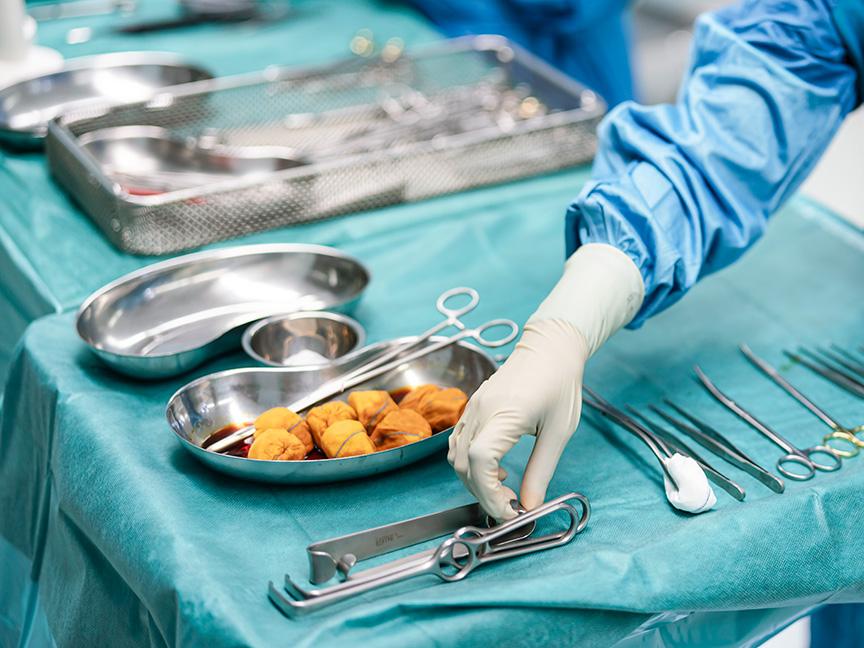
Germany needs foreign nurses
The Triple Win programme brought Chippy Bose Shaila to Bavaria. The programme, implemented by the Deutsche Gesellschaft für Internationale Zusammenarbeit (GIZ) GmbH and the International and Specialized Services (ZAV) of the German Federal Employment Agency (BA), helps recruit international nursing professionals for posts in Germany. Experts estimate that about 150,000 new nurses will be needed by 2025.
Like many other hospitals, Wolfratshausen District Hospital, which treats some 20,000 inpatients and outpatients from the Bad Tölz-Wolfratshausen district every year, depends on nursing professionals from outside Germany. Without them it would be impossible to maintain the full spectrum of medical services offered by the hospital, says Manuel Stock, operating theatre manager.
The Triple Win programme has been an important part of the District Hospital’s recruitment strategy since the start of 2021. Since then, 27 nurses from the Philippines and Kerala have been placed in Wolfratshausen. ‘Almost all of them are still here,’ Stock tells us. ‘Only three have left the hospital.’ Hospital managers have nothing but praise for the professional selection procedure and the support provided by the programme.

The selection process
Chippy Bose Shaila echoes the praise for Triple Win. In early 2023 she read an article about Triple Win published by the partner authority NORKA Roots in a newspaper in Kerala. ‘6,000 women and men applied. 300 were accepted, and I was one of them,’ she recounts. The Triple Win team selected suitable professionals and then uploaded their CVs to a database. International and Specialized Services (ZAV) propose candidates to employers in Germany, based on the profile they request. ZAV knows the preferences of the employers and of the candidates and matches the two. Local employment authorities in partner countries are involved in the process.
In line with World Health Organization recommendations, the programme only works with partner countries or regions that have a significant surplus supply of professionals. Kerala in India is one such region. Young people in the nursing profession there seek new career prospects and a good income. These were also the factors that motivated Shaila. The programme is free for the nursing professionals, while employers pay a variable fee depending on the package they select.
‘I had a video interview with Wolfratshausen District Hospital in February 2023. I was already learning German at that stage,’ says Shaila, looking back. The two sides were quick to agree, but another six months passed before Shaila could move to Bavaria. ‘That was a bit long,’ she tells us in retrospect. She made the most of the time though. She took the B1 German exam and found out more about living and working in Germany. Finally she received her visa and work permit. Triple Win supported her every step of the way.
‘I was a bit scared,’ she tells us, before the big move. A new language, a new work environment, a new culture, lots of new people – and she had to cope with everything without her daughter and her husband. ‘But my dream was to work in a European country and my family was very proud of me,’ says the young woman who rapidly overcame her initial shyness to tackle the challenges head on.
Support after her arrival in Germany
The experienced integration team in Wolfratshausen made things as easy as possible for her. ‘They organised a flat that I share with three other colleagues from Kerala, and brought in food for us for the first few weeks,’ she recounts. Supportive hospital staff also accompanied her to appointments with the local authorities. ‘I was even given a prepaid mobile phone card to welcome me to Germany.’ That way she could call her family immediately. Chippy Bose Shaila misses her nine-year-old daughter most. ‘I speak to her every day on the phone. My husband and the family are looking after her.’
Bringing the family across once she passes exams
In summer 2024, Shaila aims to pass her B2 German exam, and have her nursing qualifications officially recognised in Germany. To this end, she is attending courses in the nearby city of Munich two days a week on top of her hospital shifts. It’s strenuous, she tells us, but all in all she thinks that working conditions in Germany are good. She is planning her first trip back to India after her exams. ‘And I hope that I can then soon bring my family to Germany.’
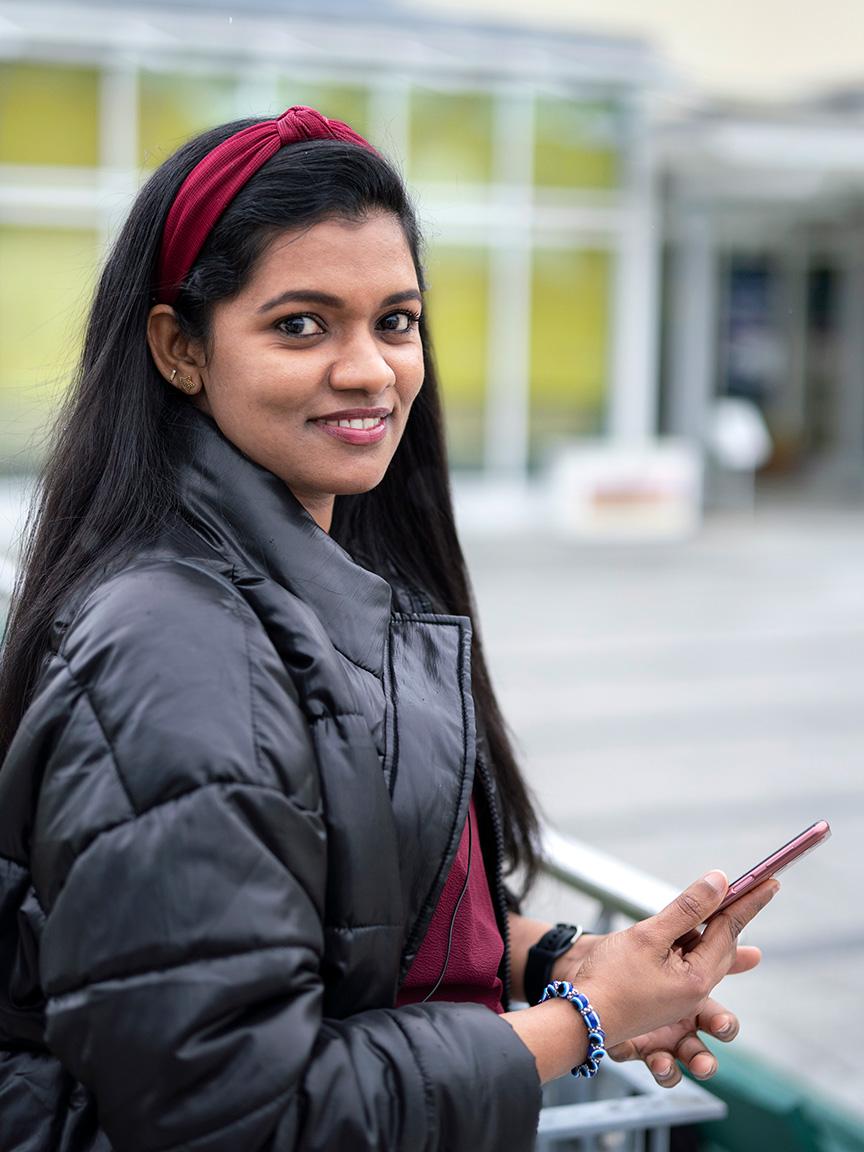
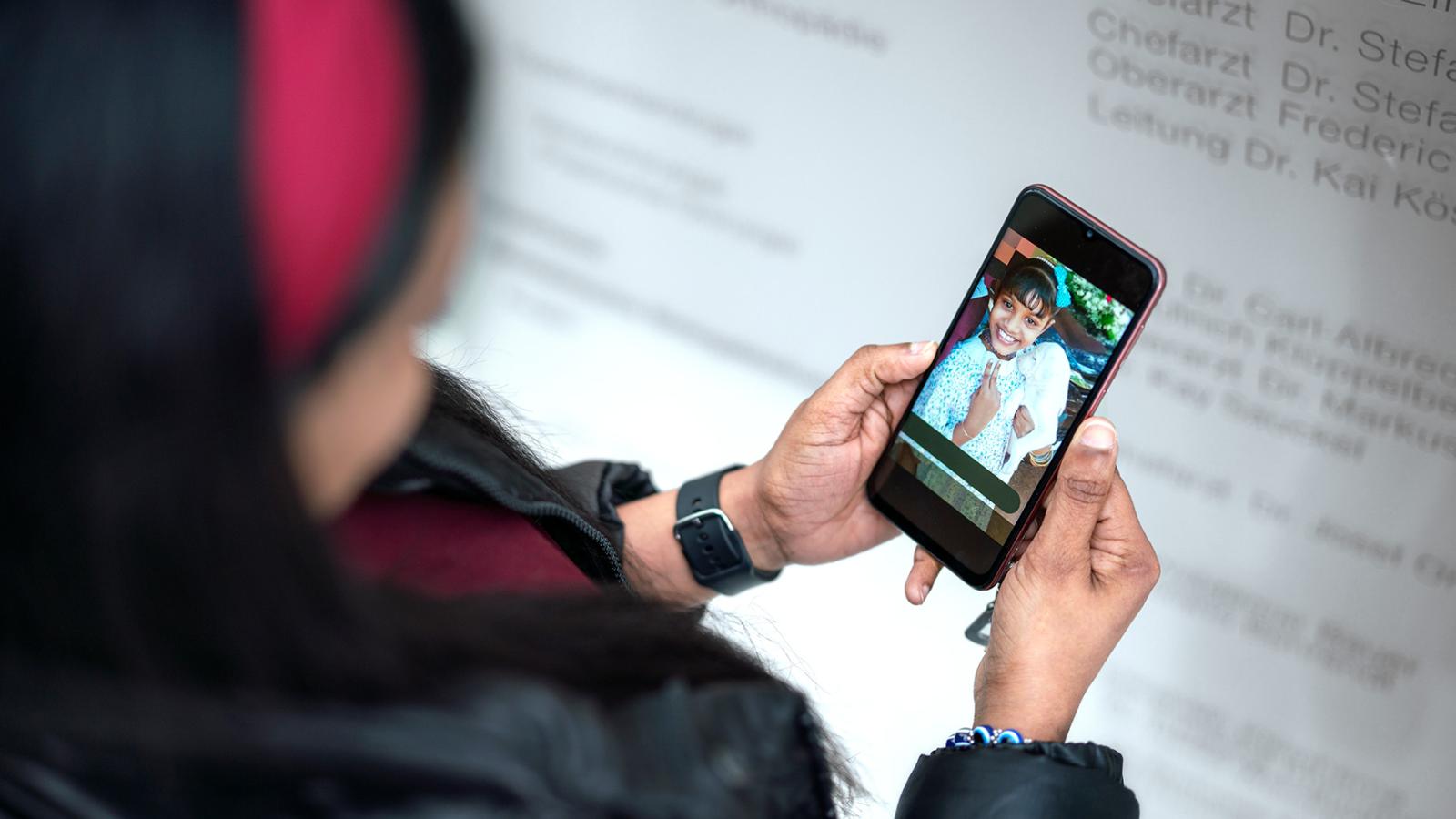
Network of nursing professionals
In the meantime she has built a network with other Indian nurses. ‘We set up a WhatsApp group during the courses in Kerala. We stay in touch in Germany, and I have already visited colleagues in the Allgäu and in Heidelberg.’ Triple Win also encourages activities of diaspora groups in Germany, which provide social support in the new environment. ‘They organise parties where we can meet up,’ Chippy Bose Shaila tells us. The hospital is planning an Indian meal soon for colleagues from Kerala and Wolfratshausen.
‘We adapt to one another,’ says chief theatre nurse Monika Schwenger. She doesn’t try to gloss over the challenges involved in integrating foreign professionals. ‘It’s a lot of work, and demands a great deal of concentration, energy and empathy on all sides.’ And as she stands by the duty roster in the corridor in discussion with the others, she puts her arm round her young colleague from Kerala. There we have it again: the human warmth that is in sharp contrast with the sterile environment of the operating theatre.
Triple Win
Through the Triple Win programme the Federal Employment Agency and GIZ have placed more than 6,000 nursing professionals from partner countries at hospitals in Germany since 2013. A survey indicates that more than 90 per cent of the professionals placed by the project are happy with their new employers and would recommend the service. Triple Win currently places nurses from Bosnia and Herzegovina, the Indian state of Kerala, Indonesia, Jordan, the Philippines and Tunisia, as well as trainees from Viet Nam.
